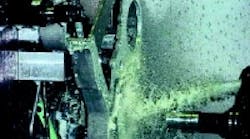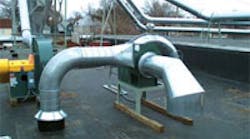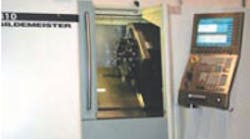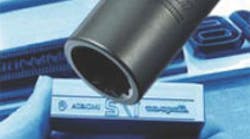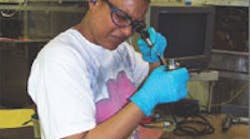By switching to Cimstar 3890 metalwoking fluid for machining its gear housings, Ward Corp. eliminated tapping failures.
Fairris Dean, machining division manager at Ward Corp., a Fort Wayne supplier of aluminum parts and components to marine, motorcycle, recreational equipment, and other industries, couldn't figure out what was causing a persistent and erratic tapping problem.
It occurred in four jobs: a gear housing, two fuel-filter heads, and a transmission case. Making the situation even more frustrating, after running three good threads, the fourth would rip out; numbers five, six, seven, and eight would run fine; and number nine would rip out or go oversize. Then ten and eleven would be okay, but twelve would fail.
Dean checked the tooling, tapping feeds and speeds, and coolant flow. All were fine, so he guessed that the tooling was gumming up and sticking because of inefficient metalworking fluid.
After consulting Specialty Tool, a local industrial supplier and Milacron distributor, he decided to try Milacron's Cimstar 3890, which is a biostable, chlorine-free, high-lubricity fluid specifically for aluminum machining, threading, and finishing applications. The results were nothing short of remarkable, says Dean.
Scrap rates for the gear housing dropped from about 7% to less than 1%, the thread problem disappeared, and tool life increased 12%. The coolant further boosted productivity by allowing higher speeds and feeds than previously run.
Dean also notes that the shop saves time and money by recycling Cimstar 3890. The shop doesn't have to flush entire systems, as with other fluids — disposing of spent fluid, cleaning out the sump, adding new fluid, and recharging.
"I can just keep making up the system with no resulting loss of fluid effectiveness," he says. "Usually, the water evaporates before I have to do anything. Then, we simply add more water and concentrate, adjusting to the proper refractometer readings."
Ward's machining division machines about 300,000 lb of aluminum annually, with as many as 486 different part numbers ranging from 100 pieces to 200,000. It mills, drills, taps, reams, finish turns, and form taps. Stock removal varies up to 0.750 in., typical materials include 356 and 319 cast aluminum, and tolerances run in the 0.0001 to 0.0005-in. range.
